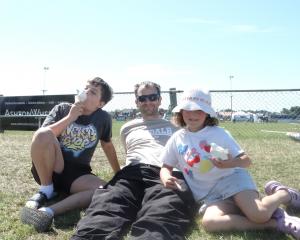At least three times during World War 2 he came close to death and then, when he retired in Oamaru, he fell off the family home he was building in Lark St, breaking his back, compressing his spine and reducing his height by about 8cm.
"The thing he was most upset about was, he was then looking us in the eye.
Before, he could look down on us," his daughter Jean Brown said yesterday.
At the end of the war, a New Zealand friend went to Mr Gaze's London home to tell his wife Win he had died in a pig sty in Poland, but he was greeted at the door by Mr Gaze himself.
Mr Gaze has celebrated some major events, most notably his 75th wedding anniversary in July last year, he and Win's second diamond anniversary in what is believed to be New Zealand's longest marriage.
Mrs Gaze died earlier this month.
Mr Gaze was born on January 26, 1910, in Harrow, near London.
When he left school he trained as a plumber, but before completing his apprenticeship he joined the family building company.
He recalled listening to the first radio broadcast from London, watching zeppelins bomb London during World War 1 and viewing the first broadcasts of television.
In 1940, he was training to be an army mechanic and was "kidnapped" from his course in Scotland by the Royal Artillery and sent to Egypt, where he was captured at Wadi Faregh as a member of the British 1st Support Group.
He was taken to Benghazi with his soldier mates where he was supposed to be loaded on to a ship bound for Italy.
Instead, in what he described as "the worst day in my life", he was left behind.
The ship was sunk and he lost all his mates.
As a prisoner of war in Italy he was loaded into a cattle truck to be railed north.
On that trip, only 25 of the 50 prisoners survived.
Towards the end of the war, the Germans forced the prisoners on a march, some dying or being killed on the way.
Mr Gaze reached the point where, despite help from fellow prisoners, he could not continue.
They buried him in straw in a pig sty in Poland.
Later that day he was discovered by American soldiers, taken to hospital then returned to Britain on the day war in Europe ended.
While in the camp in Italy, Mr Gaze became close friends with a farmer from Gore, the late Bob Weir.
After the war, Mr Gaze returned to the family business, then in 1951 moved his family, at that stage with three children (the fourth was born in New Zealand) to this country.
He lived in Gore, working as a bricklayer, moving to Oamaru eight years later where he established poultry farms in Fernbrook Rd and at Hilderthorpe.
When he retired at 65, Mr Gaze built a new family home.
He also built homes for two of his children.
The family said he was active until he had a stroke about four years ago and he and his wife moved to Totara Lodge.














